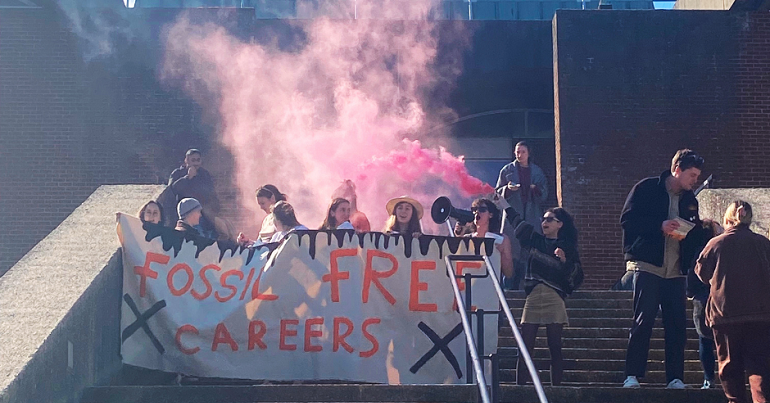Why Christian universities should sever their links with fossil fuels

I was delighted to see the news that that Bishop Grosseteste University (BGU) has become the first church-founded university to make a Fossil Free Careers commitment, and the fourth UK university to ensure oil, gas and mining companies can no longer recruit on campus. It’s a big step, but now it’s time for all other higher education institutions with links to the church to follow suit.
The university’s new Ethical Careers Policy means that fossil fuel and mining recruiters will not be allowed to attend BGU careers fairs, advertise role vacancies to students or sponsor recruitment events. As a result, its graduates will be offered career pathways outside of industries that do such tremendous harm to the planet.
Anyone familiar with the Bible knows that BGU’s action of breaking the fossil free recruitment pipeline is showing bold and prophetic leadership. The creation story told in Genesis, shows a deep reverence for the natural world, while both Old and New Testaments are rich with images of growth, water, nurturing of plants and animals, and the flourishing of life. As a result, for many Christians, stewardship of the environment is considered an integral part of their faith.
All the major churches now take this stewardship seriously having many environmental initiatives, policies and days of prayer and action for the earth. And though there is more to be done, many church leaders have also spoken out on climate justice issues. The Archbishop of Canterbury, Justin Welby has called on investment managers to push firms to reduce their impact on the environment, while Pope Francis, the leader of the Catholic Church has spoken regularly about climate issues since publishing his groundbreaking encyclical Laudate Si2. Just last month Pope Francis called for the world to get rid of fossil fuels to ‘end the senseless war on creation’ while also criticising oil, gas fracking and mining companies.
BGU’s decision to kick these unethical companies off campus demonstrates the university has a deep understanding of the Christian responsibility for the taking care of the earth, and should act as an impetus for other members of the Cathedral Group of Universities to follow suit. Although many of these universities – such as Canterbury Christchurch, St Mary’s and Winchester – have already divested from fossil fuels, divestment, alone, is not enough. As long as they continue to promote fossil fuel, gas and mining companies as potential graduate employers they will continue to contribute to the climate and ecological crises, something that their students are unlikely to tolerate. It is time for them to follow BGU’s example and make a new similar pledge, ensuring their students are provided with career opportunities that renew and replenish the planet rather than destroying it and helping them create a more just and more liveable world for all.
Virginia Moffatt is co-director: operations at People & Planet
PS. We hope you enjoyed this article. Bright Green has got big plans for the future to publish many more articles like this. You can help make that happen. Please donate to Bright Green now.




Leave a Reply